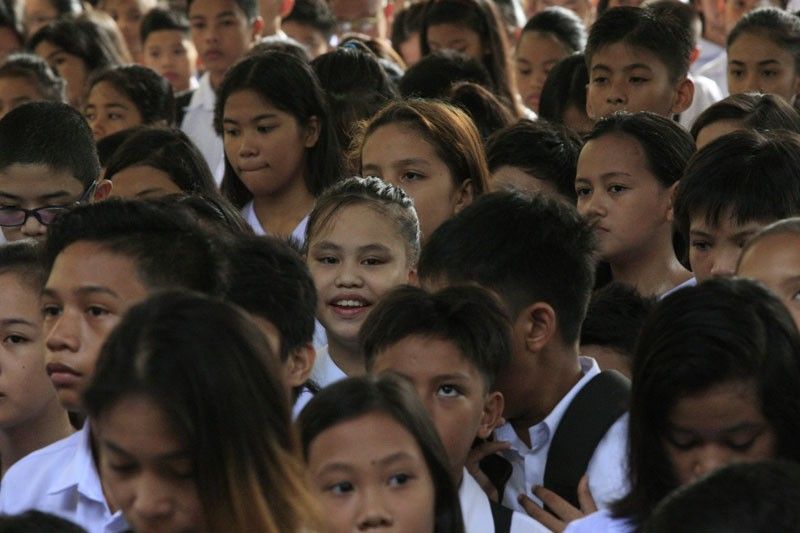130 million kids worldwide experience bullying

MANILA, Philippines — Around 130 million, or one in three children worldwide, experience some form of bullying, the United Nations stated in its latest report on how children can be better protected.
The report said this form of violence has long-lasting and direct consequences on their health, school performance and overall well-being.
Some of the initial findings of the Secretary-General on Violence against Children report denote that physical appearance – such as being overweight or having non-conforming gender expressions – is the main driver for bullying.
Race, nationality and skin color are also high on the list. In the report, religion was not highlighted as a major contributing factor.
While the term “bullying” covers physical, psychological and sexual violence (understood in this context to mean sex-related mockery and gender-based discrimination), the report said very little data are available on the psychological occurrence of it, and countries must do more to gain a better understanding of this issue.
A UN Educational, Scientific and Cultural Organization (UNESCO) report also shows that girls and boys are equally affected overall by bullying, but that boys are more likely to suffer from physical violence.
Marta Santos Pais, Special Representative of the Secretary-General on Violence against Children, identified several key areas where improvement was needed for governments and institutions.
She emphasized the importance of early childhood prevention and noted that the “parent-child relationship is a critical factor in predicting the risk of bullying in adolescence.”
According to the report, 176 million children under five witness domestic violence on a regular basis at present and children who bully others are twice as likely to have been exposed to domestic violence than other children.
“Exposure to toxic stress, domestic violence and a violent family environment has an irreversible impact on the development of very young children,” Santos Pais said, adding that “it contributes to normalize the use of violence.”
Santos Pais noted that teachers also play a great role in promoting “a culture of respect and safety” in schools and that sports environments can often become contexts where competitiveness leads to “humiliation, shaming and exclusion of those who fail to win.”
“Analyses of data from Ethiopia, India, Peru and Vietnam reveal that violence in schools, including physical and verbal abuse by teachers and by other students, is the most common reason given for disliking school and, significantly, it is associated with lower scores in mathematics and lower self-esteem,” the report highlighted.
To address these negative impacts, experts and decision-makers are lacking sufficient data to form evidence-based strategies and programmes. However, UNESCO has committed to tackling this gap and to producing an annual report to be released in January 2019 for the first time.
Filipino children at risk
In the Philippines, children are still deprived of basic rights as the country faces “barriers and bottlenecks” in the implementation of otherwise supportive laws and policy frameworks, according to a report by UNICEF.
The Situational Analysis of Children in the Philippines report found that while the Philippines has a strong commitment to and has made good progress in securing children’s rights, there was uneven performance in meeting key development targets.
The report noted that “gaps, barriers and bottlenecks” in the implementation of laws are at the core of this uneven performance in ensuring that children’s rights are protected.
The lack of a cohesive policy, which in some areas were also fragmented and issue-specific, has led to a lack of focus and inability to respond to the multi-faceted needs of the marginalized groups of children.
“These issues appear to have a cross-cutting effect, negatively impacting the different government sectors that work to improve outcomes for children and impeding the ability of the multiple laws, policies, programs and initiatives to have a real and measurable impact on children,” the report read.
In terms of governance, the UNICEF noted weak institutions and poor cooperation were the bottleneck to the fulfillment of children’s rights.
“The study found that delivery of basic services to children is hampered by poor governance, with corruption, misallocation of resources, political instability and uncoordinated government agencies as some of the key governance challenge,” it added.
Other hindrances in the promotion of children’s rights in the country include inadequate financing to essential sectors, slow budget utilization and the lack in data collection and monitoring systems.
There was also a shortage in quality trained professionals at the local level and shortage of supply and logistics management systems.
The report noted that there are social and cultural norms that impede the realization of children’s rights, like the levels of violence, regardless of socio-economic status, and the stigmatization of sexual activity among young unmarried people.
The report recommended a few measures to address these barriers that prevent children from accessing their rights, including creation of child-friendly laws and proper implementation, the increasing of government funding for quality social services and conducting more research on the implications of social norms and promoting positive social norms. – With Romina Cabrera
- Latest
- Trending





























